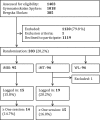Upper secondary school students' compliance with two Internet-based self-help programmes: a randomised controlled trial
- PMID: 28776094
- PMCID: PMC5842245
- DOI: 10.1007/s00787-017-1035-6
Upper secondary school students' compliance with two Internet-based self-help programmes: a randomised controlled trial
Abstract
Psychiatric symptoms and stress are on the increase among Swedish adolescents. We aimed to study the potential effect and feasibility of two Internet-based self-help programmes, one mindfulness based (iMBI) and the other music based in a randomised controlled trial that targeted adolescents. A total of 283 upper secondary school students in two Swedish schools were randomised to either a waiting list or one of the two programmes, on their own incentive, on schooltime. General psychiatric health (Symptoms Checklist 90), sleep quality (Pittsburgh Sleep Quality Index), and perceived stress (Perceived Stress Scale) were assessed before and after the interventions. In total, 202 participants answered the questionnaires. Less than 20 logged into each intervention and only 1 performed a full intervention (iMBI). No significant differences in any of the scales were found between those who logged in and those who did not. The potential effect of Internet-based self-help programmes was not possible to examine due to low compliance rates. Adolescents seem to have a very low compliance with Internet-based self-help programmes if left to their own incentive. There were no associations between the psychiatric and stress-related symptoms at baseline and compliance in any of the intervention groups, and no evidence for differences in compliance in relation to the type of programme. Additional studies are needed to examine how compliance rates can be increased in Internet-based self-help mindfulness programmes in adolescents, as the potentially positive effects of mindfulness are partly related to compliance rates.
Keywords: Adolescence; Compliance; Internet; Mindfulness; Psychiatric symptoms; Psychological stress.
Conflict of interest statement
Conflict of Interest
On behalf of all authors, the corresponding author states that there is no conflict of interest.
Funding
The Swedish Research Council for Health, Working Life, and Welfare (In Swedish: Forte) and the Swedish Research Council to Jan Sundquist.
Ethical standards
We obtained the ethical permission for the study from the local ethics committee (
Figures

References
-
- Bremberg S (2006) Ungdomar, stress och psykisk ohälsa. Analyser och förslag till åtgärder. SOU 2006:77 (Official Report of the Swedish Government) Stockholm, Sweden
-
- Petersen S. Barns och ungdomars psykiska hälsa i Sverige : en systematisk litteraturöversikt med tonvikt på förändringar över tid. Stockholm, Sweden: The Royal Swedish Academy of Sciences; 2010.
-
- Wiklund M, Malmgren-Olsson E-B, Öhman A, Bergström E, Fjellman Wiklund A. Subjective health complaints in older adolescents are related to perceived stress, anxiety and gender: a cross-sectional school study in Northern Sweden. BMC Public Health. 2012;12(1):993–1005. doi: 10.1186/1471-2458-12-993. - DOI - PMC - PubMed
Publication types
MeSH terms
LinkOut - more resources
Full Text Sources
Other Literature Sources
Medical

